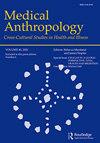The Weariness of Hoping: Synchronizing Affect While Awaiting Organ Transplantation for Cystic Fibrosis in Germany.
IF 1.5
3区 社会学
Q2 ANTHROPOLOGY
引用次数: 0
Abstract
We describe the challenges in synchronizing affect during the lengthy lead-up to organ transplantation. Our analysis draws on ethnographic fieldwork in Eastern Germany among medical staff caring for patients with cystic fibrosis, a progressive, genetic illness. Patient and practitioners must together endure an uncertain wait for a donor organ, while simultaneously living and working toward living as well as possible. The organizing affective principle in this setting is hoping, which is a socio-material practice that must be continuously and interactively re-produced. Too little or too much hoping must be managed by adjusting affective intensities. A failure to strike this balance can lead to what we designate as the weariness of hoping.
希望的厌倦:在德国等待囊性纤维化器官移植时的同步影响。
我们描述了在器官移植的漫长过程中同步影响的挑战。我们的分析借鉴了民族志田野调查在德国东部的医务人员照顾囊性纤维化患者,一种进行性遗传疾病。病人和医生必须一起忍受对捐赠器官的不确定等待,同时生活和努力尽可能地生活。这种情境下的组织情感原则是希望,这是一种社会物质实践,必须持续地、互动地再生产。太少或太多的希望必须通过调整情感强度来控制。如果不能达到这种平衡,就会导致我们所说的“希望的厌倦”。
本文章由计算机程序翻译,如有差异,请以英文原文为准。
求助全文
约1分钟内获得全文
求助全文
来源期刊

Medical Anthropology
Multiple-
CiteScore
4.10
自引率
4.30%
发文量
57
期刊介绍:
Medical Anthropology provides a global forum for scholarly articles on the social patterns of ill-health and disease transmission, and experiences of and knowledge about health, illness and wellbeing. These include the nature, organization and movement of peoples, technologies and treatments, and how inequalities pattern access to these. Articles published in the journal showcase the theoretical sophistication, methodological soundness and ethnographic richness of contemporary medical anthropology. Through the publication of empirical articles and editorials, we encourage our authors and readers to engage critically with the key debates of our time. Medical Anthropology invites manuscripts on a wide range of topics, reflecting the diversity and the expanding interests and concerns of researchers in the field.
 求助内容:
求助内容: 应助结果提醒方式:
应助结果提醒方式:


